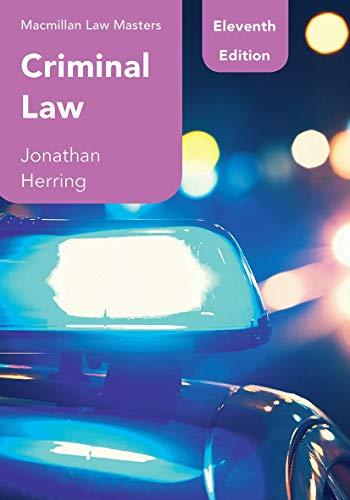Question
Jackie, an Australian fruit juice trader, arranged for a shipment of Australian apple juice to be delivered from Australia to Seoul, South Korea; an orange
Jackie, an Australian fruit juice trader, arranged for a shipment of Australian apple juice to be delivered from Australia to Seoul, South Korea; an orange juice shipment to Taipei, Taiwan; and a shipment of New Zealand grape juice from Auckland, New Zealand to Hong Kong. Jackie negotiated free in and out carriage contracts with The Freedom Carrier Co, owners of the m.v. Suez, that were subject to Australian Law and Jurisdiction and allowed for transshipment on the best terms available. At Perth, the m.v. Suez was loaded with Australian apple juice. The cargo was given a clean bill of lading with the words "weight and quantity unknown."
Later, it was discovered that there were differences in the marks on the apple juice cases between the invoice and the bill of lading. The m.v. Suez continued on to Auckland, where the orange and apple juices were loaded. The clean bills of lading issued for these goods precluded liability for third-party wrongful acts. Several crates of Australian apple juice were damaged by careless stevedores who decided to drink the contents of a number of stray bottles that fell out of the damaged boxes as the new cargo was being loaded at Auckland.
Several cases of orange juice broke free from their bindings and smashed during the voyage to Seoul due to poor stowage. Out of their Canberra office, Freedom Carrier Co issued bills of lading to Jackie for the three cargoes, subject to Australian law and Canberra arbitration. The Hague Visby Rules have been signed by Australia. The Australian apple juice bill of lading covers the shipping from Perth to Seoul.
Despite the fact that New Zealand is a signatory to the Hague Rules, the bills of lading for orange and grape juice shipments from Auckland to Taipei did not include the Hague Rules. Carlos bought the apple juice, Davis bought the orange juice, and Vaz bought the grape juice. On the endorsement of documentation for their different cargoes, each buyer paid Jackie.
The m.v. Suez then went to Seoul to discharge the Australian apple juice before heading to Taipei to discharge the orange juice and transship the grape juice onto the m.v. Bogata headed for Hong Kong. The bill of lading issued by the Espirit Co, owners of the m.v. Bogata, was subject to Taiwanese Law and Jurisdiction and excluded liability for damage caused by the vessel's unseaworthiness. It also required all claims for cargo loss or damage to be made within three months of the incident causing the loss.
During the voyage from Taipei to Hong Kong, the m.v. Bogata, which was clearly unseaworthy, began to float in heavy seas, and the master ordered the cargo of grape juice to be thrown overboard in order to save the ship. Three months and a half later, the ship arrived in Hong Kong.
Advise Carlos, Davis, and Vaz of their rights and obligations in light of the events described above with clear explanation, as well as a focus on the Hague and the Hague Visby Rule.
Step by Step Solution
There are 3 Steps involved in it
Step: 1

Get Instant Access to Expert-Tailored Solutions
See step-by-step solutions with expert insights and AI powered tools for academic success
Step: 2

Step: 3

Ace Your Homework with AI
Get the answers you need in no time with our AI-driven, step-by-step assistance
Get Started


